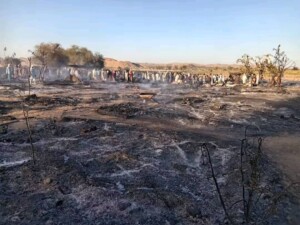French Court of Asylum rules: ‘Darfur in grip of indiscriminate violence of exceptional intensity’

French National Court of Asylum (la Cour nationale du droit d’asile - CNDA) (File photo: CNDA)
In what could form important precedents, the National Court of Asylum (la Cour nationale du droit d’asile – CNDA) in France last week granted political asylum to two applicants, from West Darfur and North Darfur respectively, acknowledging that “Darfur is in the grip of indiscriminate violence of exceptional intensity”.
A CNDA statement following the verdict of October 17 regarding “a request for international protection from a Sudanese of the Tama and Borgo ethnic group originating from West Darfur,” the CNDA granted the applicant asylum, in spite of noting that “the Court did not establish the alleged fears of persecution due to the opposition political opinions allegedly attributed to him by the Sudanese authorities and his ethnicity”.
‘Darfur is the terrain of an internal armed conflict likely to extend indiscriminately to civilians…’
However, the CNDA considered: “as West Darfur is the terrain of an internal armed conflict likely to extend indiscriminately to civilians, the Court grants it subsidiary protection”.
In a similar decision the next day, regarding “a Sudanese national from Khireyga, in South Darfur, who alleged fears towards the authorities of his country due to his belonging to the Dadjo ethnic group and the political opinions which he holds would have been imputed,” the Court ruled that “he did not meet, in this case, the conditions for benefiting from refugee status under the Geneva Convention of July 28, 1951”. However, the CNDA “granted him the benefit of the subsidiary protection provided for by European law, considering that he would run, in the event of return to his state of origin, simply because of his presence as a civilian, a real risk. to suffer a serious threat against his life or person without being able to obtain effective protection from the authorities of his country”.
Underpinning its verdict, the CNDA says: “This threat is the consequence of a situation of violence, resulting from an internal armed conflict, likely to extend indiscriminately to civilians.”
The statements outline that the CNDA based its decision “on available public documentary sources, in particular the reports recently published by the United Nations High Commissioner for Refugees (UNHCR), the United Nations Office for the Coordination of Humanitarian Affairs (OCHA), the International Organisation for Migration (IOM), the US Department of State (USDOS), the Country of Origin Information Retrieval Department (CEDOCA) of the Office of the Commissioner for Refugees and Stateless Persons (CGRS) of Belgium, as well as by the non-governmental organisations Armed Conflict Location and Event Data Project (ACLED) and Médecins Sans Frontières (MSF).











 and then
and then